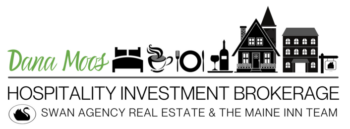The Swan Agency Sotheby’s International Realty has long been a member of PAII and I was proud to contribute to their monthly innkeeping newsletter. If you’re an aspiring innkeeper, you should give serious consideration to joining the organization. They’re a wealth of information and a great platform to start networking, even before you buy.
This was my contribution:
Buying your First Inn/B&B – The Need-to-Know Nutshell Version
For aspiring innkeepers, the initial step once you’ve made the decision to purchase an inn or B&B can often be overwhelming. At any given time there can be a number of properties of all price ranges and size on the market. So what’s your first step? It should be gaining a complete understanding of what your money will buy you. And this goes far beyond understanding what cash you will need for a down payment at settlement.
You think you might have a sense of what type of inn or B&B is ideal for you. However, from experience dealing with buyers, I can tell you that if you keep an open mind, your options will be much greater and the chance of finding the right fit much more successful. If the ideal property exists, it might be rare to find. But don’t let that concern you. What you need to focus on are the various aspects of innkeeping and each one’s importance to you and their affect on the business.
During your search there are several things to keep in mind:
· Be truthful with yourself about the aspects of innkeeping that are most important to you
· What are your Owners Quarters requirements/personal space?
· Is there an option for other revenue streams (restaurant, retail, catering, yoga, massage, etc.)
· Location affects business – is the property located in a destination or in pass-through town? Does it get weekend only traffic, does it get any business travelers?
· Season – 6 months or year round (seasonal may offer substantial time off but sometimes finding seasonal employees is more difficult than year round help). I associate a seasonal 6 month business in a busy destination location as a light switch without a dimmer – it’s either on or off. You work hard for 6 months and relax for the other 6, providing the business is strong enough
· Village or rural setting; coastal or inland; lot size affects use
· Do the current rates allow room for increase?
· Is this your hobby, primary source of income or lifestyle choice?
· And very importantly, ENJOYMENT. Ask yourself “will I enjoy being here?”
Now to the issue of what you can afford. As a rule of thumb, you’ll need to come up with a 20% -25% down payment (sometimes less; SBA offers programs allowing very little down if the business fits the criteria-talk to your lender about this option). If a property is performing, the banks might be willing to lend more and risk more since the revenue is there from the start.
So here are two scenarios:
Property A is priced at $1,000,000 and makes $170,000 in gross revenue and the resulting GRM is 5.88; Let’s presume there’s very little room for additional revenue growth. This property has 8 rooms, affords a housekeeper, supports the innkeeper’s living expenses (though not extravagant).
Property B, is priced at $695,000 makes $70,000 in gross revenue and the resulting GRM is 9.93; Let’s presume there’s 60% room for future revenue growth.
(GRM is a gross multiple of the room revenue used to help assess a business’ value)
The difference in initial cash output (down payment) is $61,000. However, there is a great difference between the two properties. Many banks look at this number when reviewing a loan. If the business value isn’t there, they may weigh the residential value more heavily, or a combination of both. Often this is the case with smaller properties. But if you have the additional $61,000 initial output, right away you might be able to walk into a turnkey property and make money from day one. Property B might take much longer to get to the desired level of income, in which case, you still have an output of cash to support the business while growing it. In either scenario, the under-performing property will require the cash, just not at settlement.
Often the following can be used as a rule of thumb:
Higher priced properties:
· higher income
· higher potential income
· more than 8-10 rooms
· affords housekeeping and sometimes an assistant innkeeper
· location, location, location
· amenities such as water or mountain views, spa tubs, body jet or steam showers, fireplaces,etc.
· can support owner’s living expenses
Lower priced properties:
· lower income
· often priced based on residential value if business value is not there
· fewer than 6 rooms
· often there is room for potential, but it might be limited because the property is already year round
· lower advertising budget, though it takes advertising to grow the business
· until the income grows, innkeepers are the housekeepers
· might require a second income source
When considering price, be sure to discuss these points with your agent. Some properties on the market today are well priced; many have a very realistic potential to increase revenue substantially therefore are priced accordingly; some will immediately provide a good income; some have spectacular owners quarters. A few of these listings offer a combination of them all. Weigh what matters to you most. But realize and understand compromise when it makes sense. And only you will know when that time comes.
Dana Moos, Associate Broker
The Swan Agency Sotheby’s International Realty

